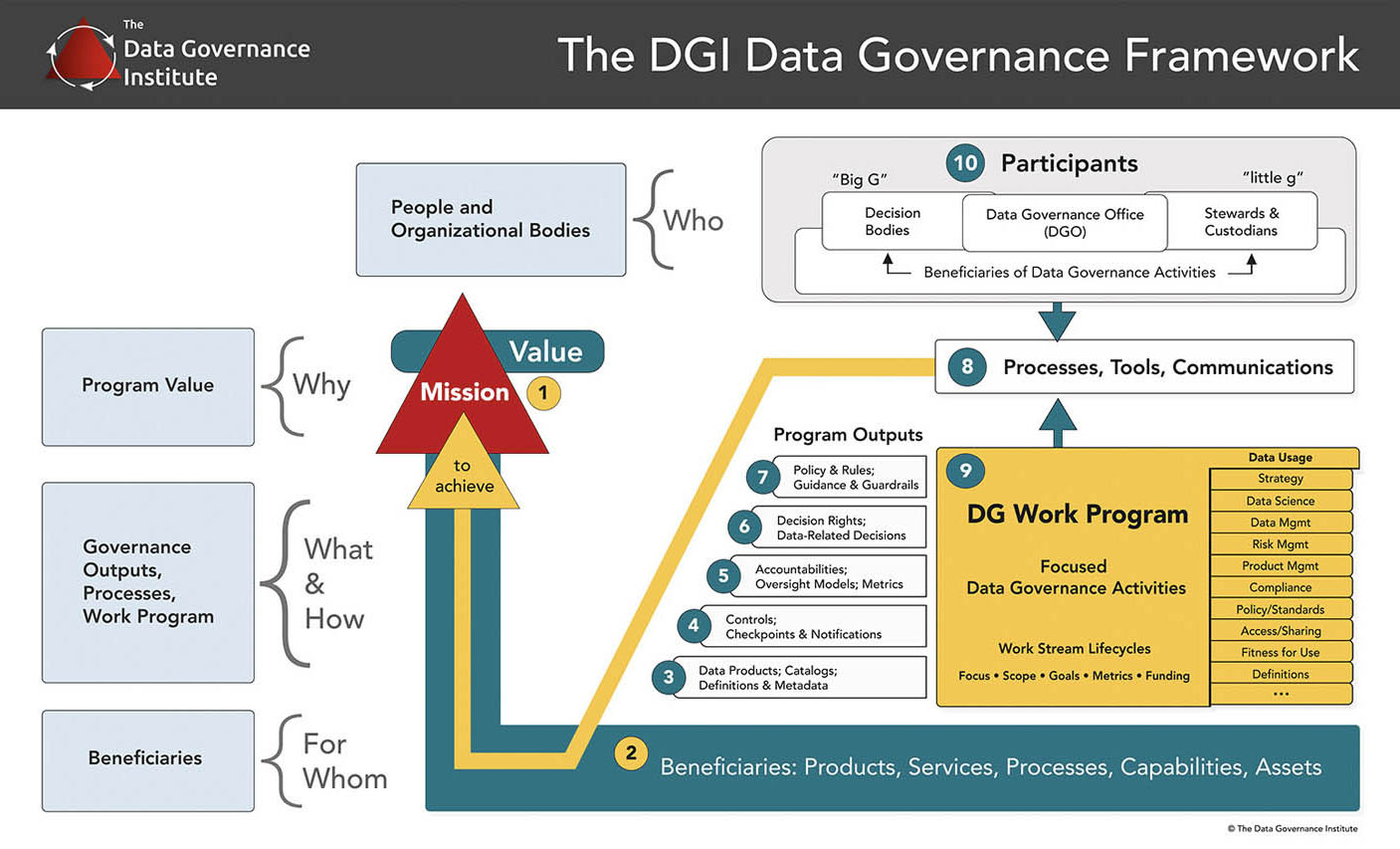DGI Implementation Assessments for Data Governance Programs
No two Data Governance programs are the same. Each one has to decide what it needs to focus on, and how best to deliver value based on its limited resources, mandates, environmental factors, and unique configuration of stakeholders, beneficiaries, and participants.
The Data Governance Institute has developed a set of questions to help guide leaders through this configuration process and staffing processes.

Data Governance leaders can also use these DGI Implementation Assessments to evaluate how well equipped they are to successfully deliver on their mandate and how well they have been delivering against those mandates.
When to use these self-evaluations:
- As you start a program
- When you inherit a program
- As you ask for funding for your program
- As you review your program’s contributions to value
- As you assess whether stakeholders, beneficiaries, and participants are on the same page
- As you consider updating your program’s mix of skills
- As you onboard individuals into decision bodies, the Data Governance Office, or into Data Stewardship positions
- As you conduct scheduled adjustments to your work program
- As you respond to issues, as part of answering whether your Data Governance efforts are focusing on needed areas
Score Sheet Template
Download this template to evaluate your organization’s performance. As you work through each chapter, consider the context of your program, as discussed in each introduction. How does your organization measure up?
The Seven DGI Implementation Evaluations
Assigning Responsibilities for Cross-Team Collaborations
Data governance can’t be all things to all people. What will your program focus on? What sort of issues will it address? What types of Data will it be concerned with? Whatever you decide, your team members will work with other teams to set standards, resolve issues, and monitor compliance.
Most organization expect programs to report on their accomplishments and the value they provide. Below are some commonly-collected metrics; consider whether they might make sense for your program.
Governance, Risk, and Compliance Accountabilities
Not all data is the same. Some has higher value to an organization. Some represents higher risk, if the data is improperly disclosed or used. Data teams need to treat such sensitive data with extra care. On top of traditional data management responsibilities, the team needs to perform tasks related to GRC (Governance, Risk, and Compliance). Following are example GRC accountabilities; consider how they apply to your program.
Data Governance Team Skills and Responsibilities
Data doesn’t govern itself. Most organizations have some form of Data Governance Office, although it may be called by many other names. As you take stock of your program, consider the skills your team needs to have to perform their responsibilities. Note: no single individual is likely to have all of these skills.
Identifying Data Governance Stakeholders
Managing, governing, and using data involves many teams across an organization. Some work is siloed, but much is collaborative. It helps to know who to contact in advance of actually working with them. Consider the list of potential data stakeholders below. Can you identify your potential point of contact if you have an informal question? Do you know who to contact if you want to request assistance or formal resources? Do you know the protocol for reaching out across organizational units? Use the list below to prompt your thinking: who should you get to know?
For each issue, standard, or other governance activity you may need to refer to specific pieces of data. It’s important that all those involved have clarity about what they’re referring to. In preparation for working together, the team should consider how best to achieve that clarity of understanding and communication. Below are some facts about the data you may need to collect.
Preparing to Participate in Conflict Resolution
Conflict happens. Disputes about how to use data or manage data exist everywhere. As a data worker, you need a toolbox full of conflict-resolution soft skills. This checklist can help you prepare for discussions where other participants are likely to be in conflict with each other. It can help you prepare to be an advocate for the enterprise, to help “balance the needs of the whole against the needs of the components.”
Individual Membership
- One-year membership for 1 person
Team Membership
One-year membership for up to 10 team members
Corporate Membership
- One-year membership for up to 25 team members

